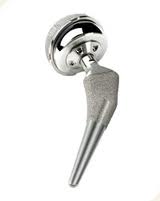Study Questions Benefits of Newer Knee, Hip Replacement Implants
Researchers have found few benefits and an increased risk of side effects associated with new hip implant designs.
According to the findings of a new study, recent advancements in knee and hip replacement implants provide little added benefit for patients, and in some cases may actually increase their risk of suffering serious complications. Over the past few years, a number of major recalls have been issued for dangerous or defective knee and hip replacement systems, resulting in thousands of product liability lawsuits and raising questions over whether the devices were adequately tested before being allowed on the market. If you have undergone surgery for a knee or hip implant, and you have since suffered complications as a result of the implant failing, our consumer advocates at the Leading Justice can help put you in touch with a product liability lawyer who has experience handling defective hip implant claims.
Defective Medical Device Injuries
In a study published this week in the British Medical Journal, researchers indicated that medical device manufacturers appear to be introducing poorly-designed products to consumers, and noted that they were unable to find any convincing evidence that newer hip and knee replacements are any better than the devices that have been on the market for years. Using data from the U.S. Food and Drug Administration (FDA), the study authors examined clinical trials and studies involving 15,384 devices implanted in 13,164 patients. The researchers focused on five specific innovations that were recently introduced in the joint replacement industry, and reported that they could find no improvement in the survival of the devices. They also found that, in three out of five cases, patients required revision surgery to remove or replace malfunctioning devices.
Metal-on-Metal Hip Implant Devices
The most well-known case of potentially defective medical devices being implanted in patients in recent years is the metal-on-metal hip replacement device, which was designed to increased durability for younger and more active users. However, reports of problems with these all-metal hip designs began to surface at alarming rates, and many patients reported suffering catastrophic failure of the implant, requiring revision surgery to remove or replace the device. The problems finally came to the attention of the public in August 2010, when DePuy Orthopaedics issued a recall of its widely-used ASR metal-on-metal hip implant, due to the potential for the devices to shed metal particles into the tissue and blood of patients, leading to metal blood poisoning, tumors and necrosis.
Problems With New Implant Designs
Similar problems have plagued other implant designs that include a modular femoral component with two pieces that fit inside one another to allow surgeons to adjust the size of the piece depending on the patient. In July 2012, Stryker issued a recall of its Rejuvenate hip implant, after the manufacturing company acknowledged that the components are prone to corrode and fail as they rub against one another during normal use. “We did not find convincing high quality evidence supporting the use of five substantial, well known, and already implemented device innovations in orthopedics,” the researchers wrote. “Moreover, existing devices may be safer to use in total hip or knee replacement. Improved regulation and professional society oversight are necessary to prevent patients from being further exposed to these and future innovations introduced without proper evidence of improved clinical efficacy and safety.”
Contact a Defective Hip Implant Lawyer Today
Following the DePuy ASR recall in 2012, the Johnson & Johnson subsidiary agreed to pay $2.4 billion to resolve more than 12,000 artificial hip implant lawsuits, and the company still faces a growing number of complaints filed over side effects resulting from its other metal-on-metal hip implant designs. Thousands of lawsuits have also been filed against Stryker over its Rejuvenate hip implant recall, which came only after an estimated 20,000 Rejuvenate devices were implanted in patients. If you believe you have been adversely affected by artificial hip implant side effects, contact a knowledgeable product liability lawyer today for legal help. With a defective hip implant attorney on your side, you can protect your legal rights and seek fair and timely reimbursement for your hip implant injuries, medical bills, and pain and suffering.
[box type=”note” align=”aligncenter” ]Source: http://www.bmj.com/content/349/bmj.g5133[/box]




